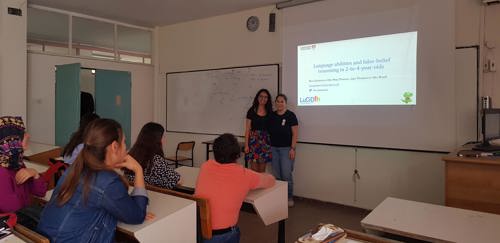
In April 2019, I had the amazing opportunity to visit Izmir, Turkey for five weeks to conduct a cross-linguistic study on children’s language, source-monitoring, and perspective-taking abilities all thanks to the LuCiD travel award.
My current project within LuCiD is about the relationship between children’s language skills and their ability to view situations from other people’s perspectives. As a team, we have always been curious about the cross-linguistic aspect of this relationship. Turkish is a structurally different language from English and it includes evidential markers that specify one’s source of information (see the examples below).

This grammatical structure does not exist in English obligatorily and we were interested in whether this difference might influence the way Turkish children understand other people’s intentions compared to their English-speaking peers. To examine this, I worked with 50 3- and 4-year-old Turkish-speaking children in their nurseries. I visited three nurseries in Izmir to complete the data collection. Our test battery aimed to measure children’s vocabulary knowledge, their ability to use evidential markers, their perspective-taking skills, source-monitoring abilities (i.e., the ability to follow the source of their knowledge) and their short-term memory.
Conducting a cross-linguistic study requires a lot of behind-the-scenes preparation. I needed support with the translation and back-translation of the tasks I was using, making connections with the nurseries, and secondary data transcribing and data coding. I cannot thank Ege University’s Psychology department enough for their welcoming attitude and support. Dr Duygu Kandemirci, who is a Counselling Psychologist at the university put me in contact with the nurseries as well as providing me with a work space on campus. Dr Cansu Pala, who is a Research Associate in Ege University’s Psychology department provided me with language tests in Turkish, helped me recruit undergraduate students as Research Assistants for data transcribing and reliability-coding, and shared her expert knowledge with the translation back-translation process. I was also invited to give a talk about our LuCiD project as part of her third year Cognitive Psychology module. The students were very interested in, and enthusiastic about, the topic, to the point they did not leave the classroom after the lecture ended and asked lots of interesting questions. We even had a big selfie with the entire classroom after the lecture to capture their excitement to learn about LuCiD, however due to a fault on the phone we used, the photo unfortunately disappeared. You can imagine a group of bright students with big smiles on their faces!

I also had the chance to have a meeting with the amazing Head of Department, Prof. Sonia Amado who told me about the exciting research projects happening at the department.  One more person I would like to thank is Dr Hale Ögel-Balaban, whose research inspired us to create our cross-linguistic study. I was hoping to visit her at Bahçeşehir University in İstanbul during my time in Turkey, however testing took longer than planned and I could not fit the Istanbul journey in. But our Skype meeting was just as informative and inspiring.
One more person I would like to thank is Dr Hale Ögel-Balaban, whose research inspired us to create our cross-linguistic study. I was hoping to visit her at Bahçeşehir University in İstanbul during my time in Turkey, however testing took longer than planned and I could not fit the Istanbul journey in. But our Skype meeting was just as informative and inspiring.
I would like to thank LuCiD for giving me the opportunity to visit Izmir to start this hugely exciting cross-linguistic study. Currently we are in the process of collecting data from the English-speaking children. I am looking forward to finalising this study and finding out the results! Teşekkürler LuCiD for making cross-linguistic research possible!

